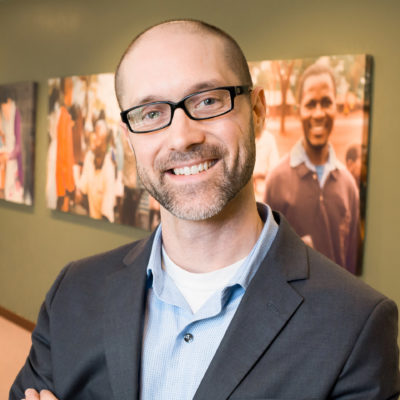
A Biblical Worldview is Caught Not Taught
Want Your Students to Live with a Biblical Worldview? Add These 2 Key Pieces to Your Youth Ministry.
The job description of a youth worker is simple. Make disciples. If we dove a little deeper into that description, I would add, make disciples who make disciples, who then make disciples. I think that when you boil it down, we are not in the business of running great programs, writing books, crafting the most impactful retreats, or even publishing the most comprehensive curriculum. These are all just tools to help us on our mission, our mission to make disciples. However, these tools are only a part of what we need to make disciples, who make disciples.
Another key element of that disciple-making process is preparing students to engage their world with the gospel, rather than conform to it, hide from it or run from it, by helping students look out into the world and see it through the eyes of Jesus. Discipling is about teaching students to understand what a Christian worldview looks like. When confronted with things like trust, truth, social issues, history, politics, family life, media, and morality; how can we walk with them so that they are being guided through life grounded in the reality of biblical truth?
Whether we choose to accept it or not, the world we knew as students is far different than the world our students are faced with today—with an entirely different set of presuppositions with different set of moral standards, different ideas of truth, a different view of authority, and a different idea of the role the Bible plays in life. The list goes on. As a result, many of us have found ourselves staring at a generation we don’t understand with challenges we have never faced or anticipated. We stand paralyzed in fear of the terrain before us. Maybe it wasn’t what we expected. Maybe the theories taught in seminary are no longer relevant. Rest assured, regardless of the reason, we find ourselves in good company.
Remember what the disciples were doing after Jesus had resurrected? John’s gospel describes the disciples meeting in an upper room with the doors locked because they were afraid of the Jewish religious leadership—for good reason. Maybe their crucifixion was next. The disciples were staring at unchartered terrain. Paralyzed in fear, they just waited. But then Jesus shows up and lays on them the missional responsibility to carry the work he started to the rest of the world
(John 20:19). They had to change their entire ministry model. Everything they had learned to do with Jesus, they now had to do without him. The model may have changed, but the mission had not. It was still about going into the world and proclaiming the gospel. Jesus made disciples. It was now their turn to go and make disciples. We bear that same responsibility as we make disciples of our students. We are sent so that our students might be sent. But that sending requires not only a keen and thorough understanding of the Bible and what it means to live a morally upright life. It also means having the ability to understand and engage the world they live in every day without falling victim to it.
What are we up against?
The disciples were up against the Jewish elite, the pagan religious practices of the Gentile world, and the Roman Empire. They had to figure out how a Jesus view of the world could infiltrate and transform that world. We are up against secularism, skepticism, and alternative forms of spirituality. If my time spent with students over the years has taught me anything, it's that, despite how much students talk of their love for Jesus, a biblical worldview in areas like social sciences, psychology, politics, or history is highly questionable if not absent entirely. Instead of a biblical worldview, students have been taught to create two spheres or compartments of life. One compartment is designed for our religious life. In it, we keep things like church, retreats, devotional time, prayer, etc. This is our private life. It's the space we reserve for Jesus. The other compartment is where we keep the rest of our life. The public side of life—the life we share with the rest of the world. Whether we have realized it or not, we have drawn a clear line in the sand between the secular and the sacred—and we have taught our students the same practice. Students, therefore, have no context for how to infiltrate and transform their world with the gospel. Houston Baptist professor and author, Nancy Pearcey says it this way,
The reality is that most students lack the sense of how Christianity functions as a unified, overarching system of truth that applies to every area of life. Instead, they hold to Christianity as a collection of truths, but not as Truth. - Nancy Pearcey, Total Truth
But wait a minute. We have a youth group, Bible memory, retreats, small groups, and conferences. Isn't that enough? What about all the effort and investment churches are making into youth? Track with me for a moment and let's get further beyond the great programs and
millions of dollars invested. Clearly, participation in church and technical proficiency of the Bible is a huge piece. But it is a piece. Imagine a beautiful classic corvette or mustang, without an engine. It is great to look at, has a ton of potential, but it sill needs an engine. Some people may never even notice, but that doesn’t change the fact the car needs an engine. Teaching your students how to live and breathe a biblical worldview is the engine. It is the stuff under the hood, the stuff that most don’t see or ever admire, yet is essential to go anywhere. In short, our students need to be taught to think like a follower of Jesus. They are wonderful worshippers, great prayers, selfless servants, but far too often give way to secularism when it comes to matters outside of the church building.
Here are Those 2 Key Pieces
So what can we do? What can be done as pastors, youth leaders, and parents to be certain that when our students hit the pavement of the college campus, the corporate office or even the family gathering; they have the tools necessary to treat their everyday lives as a mission, and as a means to take the name of Jesus to the nations? How do you build an engine?
Through various books, my experience of trial and error and even suggestions from students themselves, I have tried at least a dozen different strategies and programs. All of which I had hoped would launch my ministry into an entirely new dimension of effectiveness. But of all of those ways—some worked, most failed—I have found two simple, yet very intentional pieces that year after year made the greatest, lasting impact. In other words, although some engines are bigger and more powerful than others, these key parts are essential for all of them.
First key. As leaders, we must explore with our students what a sanctified life means in their context. Not just in preparation for the life to come, but holiness for this life now. Following Jesus is not about tapping into a magic formula to catch your reserved flight to heaven. It is about a missional lifestyle that captures every part of life and makes it obedient to Christ. Every step, in every sphere, walking as Jesus did. But a missional life cannot be taught it must be caught. Students need to see you setting the example. They need to see you get it right. They even need to see you get it wrong from time to time. Remember what Paul said. “Follow my example, as I follow Christ’s example” (1 Corinthians 11:1).
When I first started teaching, I was told that students don't care how much you know until they
know how much you care. Today, I think that is only partially true. The millennial and digital generations are less impressed with the know-it-all on stage telling them how they should live and much less likely to seek out wisdom from on high. Instead, they want to see us humbly walk with them and participate. They are looking to be shown rather than told.
Second key. What if youth group was more of a training ground, or like an inoculation? Think about what your ministry could look like if you intentionally created “battle like” conditions in a controlled environment allowing students to wrestle with ideas, issues at school or home, even politics? Creating a training ground means helping students properly filter these things through a biblical worldview. Correct, rebuke, and train. Their missional success in this world begins with their preparedness now. Believe me. Students are eager to learn. They have questions and want answers. Challenge them. They will rise to it.
This is more than just a shift in thinking. It is a shift in lifestyle. We, as youth leaders, need to live missional and invite students into that space. Invite them into the challenges, the successes, and the failures. Invite them to follow your example as you seek to follow Christ. And then provide them opportunities to lead others. Show them what it means to see the world as Jesus does so they don’t merely strive to just successfully survive the world, but transform it and redeem it for the kingdom of God.
Steve Kozak
Executive Director of AwanaYM
Steve currently serves as the Executive Director of AwanaYM. Previously, Steve spent over a decade teaching high school theology and apologetics from Detroit to LA. Steve holds a Masters degree in Theology from Moody Theological Seminary and a Masters in Christian Apologetics from Biola University. Steve is also an adjunct professor at Trinity International University. He speaks and writes on youth ministry, youth culture and apologetics. He resides in Chicago, IL with his wife and four children.FollowSteve Kozak on Twitter: stevenmkozak
Comments
Get the AwanaYM Update
Receive youth ministry resources in your inbox. Subscribe today!
